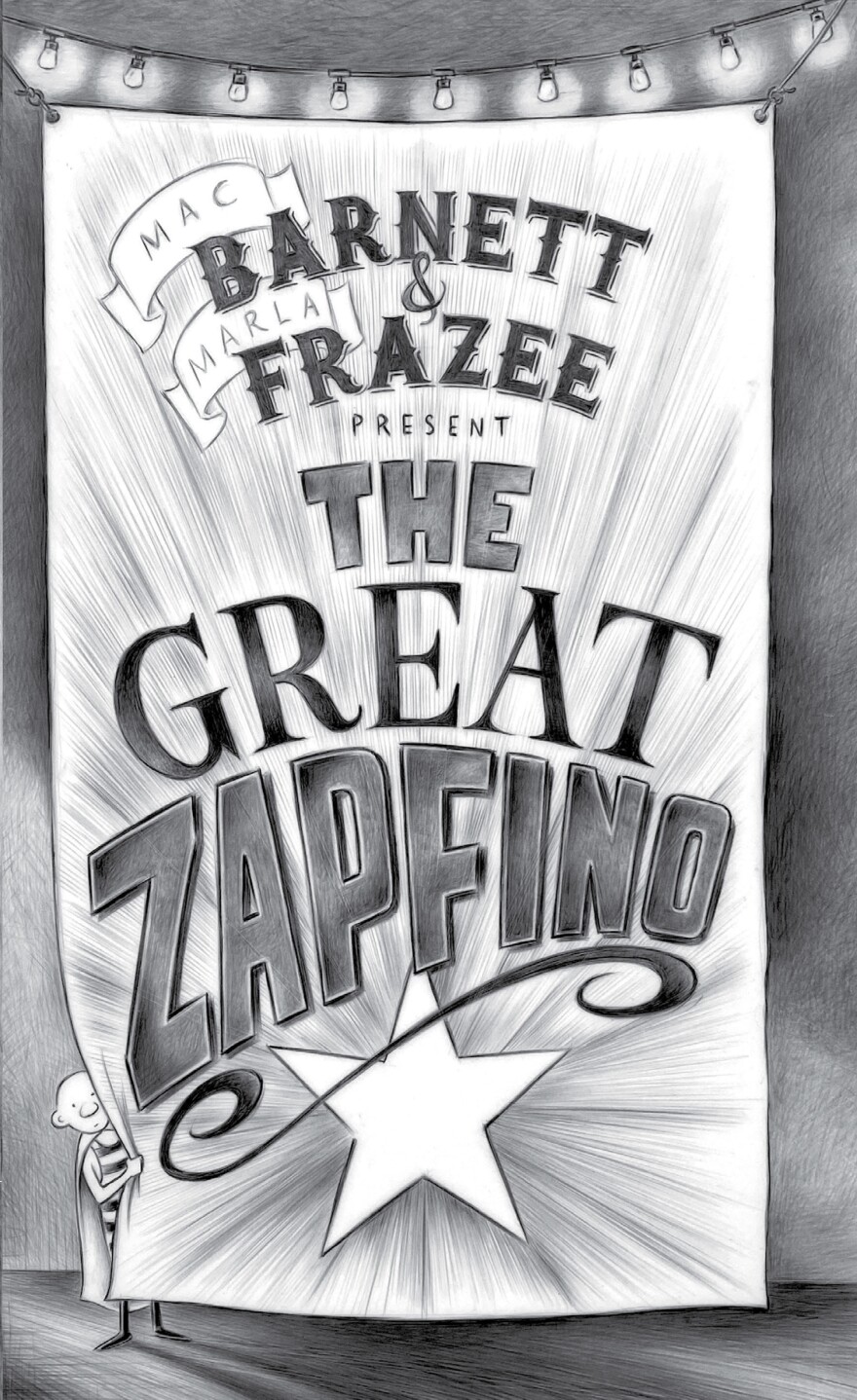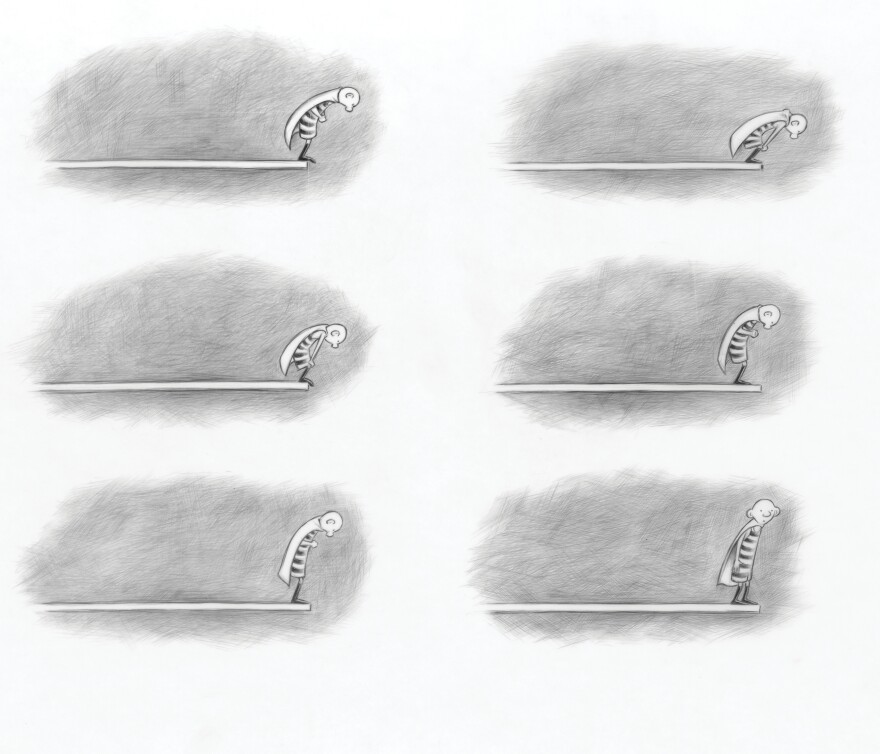The Great Zapfino is a circus performer whose act is called "The Leap For Life." When the book opens, he's climbing up a ladder, preparing to jump off a high-dive onto a trampoline. But when the ringmaster hypes up Zapfino's terrifying 10-story dive, Zapfino gets scared. He can't make the leap.
Instead, he climbs back down the ladder, goes to the airport and starts a new life in a new city, with a new job — far, far away from the circus — and tries to overcome his fear.
And all of that, everything that happens after Zapfino climbs back down the ladder, happens wordlessly.
Mac Barnett wrote 73 words in total for The Great Zapfino and nine of them are "Zapfino."
"It's definitely the shortest manuscript I've ever written," says Barnett.
In addition to the few words in the book, Barnett also wrote one page of notes — what he calls an "emotional blueprint" — with some suggestions for what might happen to Zapfino after he flees the circus, and how the ex-acrobat might eventually gain some stability. Barnett left illustrator Marla Frazee to fill in the details.
"That whole section was fascinating to me," says Frazee. "There was this whole middle to be puzzled out."

Passing off the middle of the story was a huge act of trust, says Barnett, but he and Frazee have known each other for more than a decade.
"Marla and I are both picture book obsessives," says Barnett. "I have so many memories of just like standing near a table full of snacks, talking to Marla for an hour or more, and the party sort of closing down around us as we just got lost in talking about what picture books we were reading, what picture books we loved as kids, what informed our work and how these things actually work. The magic of the form."
In addition to being an illustrator, Marla Frazee is also the author-illustrator of her own children's books, including Roller Coaster, The Boss Baby, and Boot & Shoe. She was awarded a Caldecott Honor for All the World and A Couple of Boys Have the Best Week Ever.
Mac Barnett is himself a two-time Caldecott Honor winner for Extra Yarn, and Sam and Dave Dig A Hole — both illustrated by Jon Klassen.
Barnett and Frazee say they were excited to finally get to work with each other.
"I remember one of Mac's books... I was so jealous that I didn't have the opportunity to be the illustrator," says Frazee. "Then when I saw this text, I jumped at it."

When they started working on The Great Zapfino, Frazee and Barnett had a long discussion. "It was more an emotional and philosophical talk about how the book worked and how the book felt, than it was about any sort of technical stuff," says Barnett. He also gave her free reign to ignore all of his notes and suggestions.
"We were on the same page about what we wanted to accomplish," says Barnett, "and how that was executed was totally up to Marla."
One of those suggestions: to have Zapfino blend into everyday life after leaving the circus. Frazee disagreed. "I wanted him to remain Zapfino," she says. But where could Zapfino go in his circus outfit and still fit in?
Frazee immediately thought of Venice Beach, California. She had recently seen a photo of three kids rollerblading on a beach boardwalk wearing capes, and immediately knew Zapfino would blend in. The other thing Frazee had to decide: Zapfino's job. Since standard children's books are only 32 pages long, she knew it would be inconvenient to waste valuable real estate having Zapfino commute to and from work.
"I was real excited when I kind of came up with the idea that he could live on the top floor of this apartment building and be the elevator operator. Which would mean he doesn't have to commute back and forth too far," says Frazee.
As an elevator operator, Zapfino meets all kinds of people: happy families, rich people, poor people, children, people who fight, old people, people who are nice to him, people who are not, people with their dogs. He rides up and down in the elevator all day, every day, possibly for years — encountering a vast sea of humanity and having all sorts of experiences.
"Just finding himself in that process and overcoming fear," says Frazee. "Which is really what I think the book is addressing."
She envisioned The Great Zapfino as a graphic novel for young children — repeating panels of Zapfino in the elevator car help show the passage of time. And she decided to illustrate it without color. "There was something about the anonymous nature of what Zapfino craved that felt like maybe it should proceed in black and white," she says.
She used a black Prismacolor pencil on Dura-Lar for a smooth, dark line on a velvety soft paper.

When he first saw Frazee's sketches, Mac Barnett gasped. "Marla wrote so much and added so much to this world and to Zapfino's character," he says. "It's such a wonderful, weird feeling to be surprised by a book you wrote."
For her part, Frazee says she was grateful for the creative space in this book. "This one felt so personal to me," she says.
During their earlier conversation about the book, Frazee says she asked Barnett where this story about Zapfino had come from. Barnett told her that he was interested in writing about a character who feels out of place in his own story.
That idea is what stayed with Frazee. "I wrote it down. I thought about it a lot," says Frazee. "Because we all feel that way sometimes."
"It's a feeling that probably characterizes my whole life more than any other," she says. "Like, I never have felt ready to do the thing I was supposed to do next. And I have to go through all kinds of acrobatics to get to the place of being able to do the thing."
Even though most kids are probably familiar with the feeling — metaphorical or real — of standing at the edge of a high dive, being unable to jump. It's unusual, at least in children's books, for the main character to fail to do the one thing he is supposed to do. That's why, Barnett explains, the narration drops out.
"This wasn't supposed to happen," he says. "Nobody was prepared for Zapfino to do what he did." Maybe there was text for a whole other book written, one where Zapfino does the exciting thing we all expected him to do, but he flipped the script, and now we have to watch the rest of his story unfold in silence.
"I love to write about characters not rising to the challenge, at least the first time they try something," says Barnett. "And failure, I think, is interesting to me over and over again."
Zapfino, of course, is able to overcome his fears by the end of the book. But both Marla Frazee and Mac Barnett hope that kids — and adults — can learn from Zapfino that it's ok to fail, and to not do what everyone expects you to do.
"It is brave to say 'No, I'm not ready,'" says Frazee. "That's not a story that's told very often to us, as we're growing up. And I think it's important."
Samantha Balaban and Melissa Gray produced and edited this interview for broadcast.
Copyright 2023 NPR. To see more, visit https://www.npr.org.






